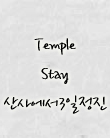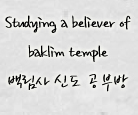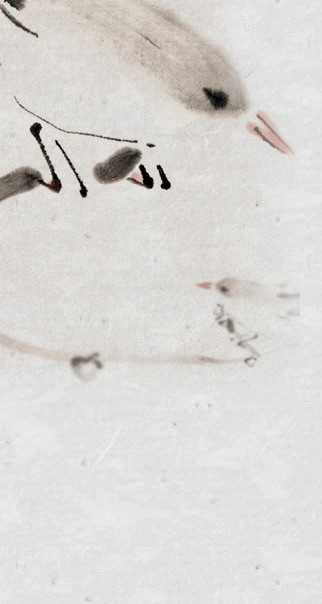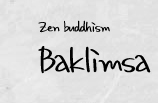Question: What is the meaning of giving food to the monks?
Nina: As regards the giving of food to the monks, some people doubt whether that is of any use. They are inclined to think that monks want to have an easy life and that they do not have to work at all, but they forget that the real meaning of being a monk is seeking the truth.
A monk’s life is a hard life, he does not have a family life, he cannot choose his own food and he does not take part in any entertainment such as going to the movies or football matches. He renounces the luxuries of a home, entertainment, choice of clothing and food, in order to seek the truth and to help other people to find the truth as well.
질문: 스님들에게 음식을 보시하는 것은 무슨 의미입니까?
대답: 스님들에게 음식을 공양하는 것이 무슨 소용이 있느냐고 의심하는 사람들이 있습니다. 그런 사람들은 흔히 스님들은 일도 하지 않고 편안하게 살아간다고 생각합니다. 스님이 되는 진정한 의미는 진리를 추구하며 살아간다는 것입니다. 스님들의 삶은 매우 힘듭니다. 스님들은 가정생활도 없고 음식을 선택할 수도 없으며 영화를 본다든지 축구경기 같은 것을 보는 오락시간도 가질 수 없습니다. 스님들은 진리를 추구하기 위해서 또 다른 사람들이 진리를 찾는 것을 돕기 위해서 가정생활의 안락함과 음식이나 옷을 주어지는 대로 수용합니다.
When people give food to the monks their act is one which will be fruitful for both parties. The giver will benefit from his act because he has a wholesome mental state at the time of giving: when there is generosity there is no greed or attachment. The receiver will benefit from the act of the giver because he is encouraged to study and practise the Buddhist teachings more earnestly and to help other people to know the teachings as well.
승려에게 음식을 보시하면 그 행위는 양쪽에 다 이익이 됩니다. 보시자는 보시할 때의 마음이 선심이기 때문에 그 행위에서 이익을 얻습니다. 관대함이 있으면 탐욕이나 집착이 없습니다. 보시를 받는 사람은 보시자의 행위로부터 이익을 얻는데, 그 이유는 붓다의 가르침을 더욱 더 열정적으로 공부하고 수행하도록 고무 받고 또 다른 사람에게 가르침을 알 수 있도록 더 많이 도움을 줄 수 있기 때문입니다.
He knows that the food he receives puts him under an obligation to be worthy of the gift, to work for the spiritual welfare of the whole world. Monks are continually reminded of their responsibility as monks, and twice a month they recite the rules of "Pāṭmokkha" in which their obligations are summed up. Furthermore, when the receiver is aware of the wholesome state of the giver, he will rejoice in the good deeds of the giver and thus he will have a wholesome mental state as well; he will be inspired by the generosity of the giver.
음식을 받았기 때문에 그에 상응하는 의무, 즉 세상의 정신적인 복리를 위해 힘써야 한다는 것을 압니다. 스님들은 계속해서 승려로서의 의무를 되새깁니다. 한 달에 두 번 승려들의 의무를 요약해 놓은 빠리목카라고 하는 규율을 암송합니다. 더 나아가, 보시를 받는 사람은 보시자의 선한 마음을 알아차리고 마찬가지로 선한 마음이 됩니다. 보시자의 관대함에 고무될 것입니다.
Question: Do you not find it difficult to think in terms of "mental states"? Thinking of one’s own mental state might seem an ego-centric attitude.
Nina: Thinking of one’s own mental states is very realistic, because it is the different mental states which make us act in this way or that. Only if we study our mental states and the many factors which cause them to be like this or that, will we(아마 we will?) be able to understand the deepest motives of our behaviour. We have to start by being aware of our own mental states. This is not egocentric, because we have to understand ourselves first, before we can understand other people. Through the study of the abhidhamma one can begin to have more understanding of one’s own mental states. The Abhidhamma is that part of the Buddhist teachings which analyses the different states of mind and which explains in detail about everything which is real. The study of the Abhidhamma helps us to understand which causes bring which effects in our life and in the lives of other people.
질문: “마음”이란 말을 쓰면 좀 거북하지 않습니까? 사람들의 마음은 자기중심적으로 보입니다만...
대답: 사람들의 마음을 생각해 보면 참 리얼하죠. 왜냐하면 이런저런 방식으로 행위 하도록 만드는 게 다양한 마음들이니까요. 우리로 하여금 이렇게 저렇게 하도록 하는 마음과 마음의 작용을 탐구할 때만 우리는 우리 행동의 심층적인 동기를 이해할 수 있습니다. 우리는 우리자신의 마음을 알아차림으로서 출발해야 합니다. 이것은 이기적인 것이 아닙니다. 왜냐하면 우리는 남을 이해하기 전에 우리 자신부터 이해해야 하기 때문입니다. 아비담마를 공부하면 마음에 대해서 더 많이 알 수 있습니다. 아비담마는 다양한 마음을 분석하고 실재하는 모든 것에 대해서 상세하게 설명한 붓다의 가르침입니다. 아비담마는 스스로의 삶과 다른 사람의 삶에서 무엇이 원인이고 무엇이 결과인지를 우리가 이해할 수 있도록 도와줍니다.


















